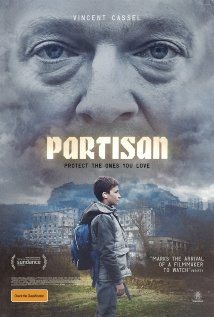
PARTISAN
Australia, 2015, 98 minutes, Colour.
Vincent Cassell, Jeremy Chabriall, Florence Mezzara
Directed by Ariel Kleiman.
Partisan was made by Melbourne director, 28-year-old Ariel Kleiman. It is an ambitious film which has played in festivals and received acclaim. Specialist audiences will admire it but it may be too specialised for the general public.
The film has the added advantage of the presence of celebrated French actor, Vincent Cassell. He plays an enigmatic character, Gregori, who is seen at the beginning of the film solicitous about children, about a young woman who is to give birth, his fascination with the child. Then time passes and we see Gregori with many children.
What has happened is that Gregori has set up a kind of commune which is more akin to a cult experience with him serving as guru, with some sinister overtones. He is father and father-figure, educating the children, rewarding them for their efforts, giving them gifts, karaoke singing and jollity. But, there is something very sinister about him.
The children are being trained in all kinds of practical matters, mechanics, mathematics. But they are also being educated to be potential assassins, given guns, having target practice, being commended for their efforts.
But it is one boy, Alexander, Gregori’s son, who is expert, especially in the use of guns and even a killing which is vividly shown the motivation never explained. But, there seem to be seeds of doubt in Alexander’s mind as he deals with the other boys, the other boys and girls, and Gregori’s special tuition.
This explanation of some of the plot lines may be clearer than the experience of actually watching the film itself. At times, it seems quite obscure, the audience having to work hard to listen to the dialogue, observe the performances, to try to work out what is exactly happening in Gregori’s mind, in his behaviour, as well as the response of the children and of the women who play a supporting role in the commune.
The other significant element is the location of the commune common – the filming was done in the central Asian country of Georgia, with a war-torn atmosphere, and ordinary towns and suburbs outside, but the commune is partly established in some of the ruins of action.
While one admires the skills and talent of the director, admiration is the keyword rather than personal involvement in the story – despite the intriguing aspects of Gregori’s character and the fine performance by the young Jeremy Chabriell as Alexander.
1. The title? Partisans for which country? Grigori as a partisan, Alexander, the community?
2. The Eastern Europe setting, the anonymous nation, the city, the commune? Visuals, the homes within the commune, the children playing? The look of the commune? Musical score?
3. The director, Australian, the European perspective? Festival awards?
4. Grigori, his story Western Mark introduction to him, age, his look, occupation, with the children? The children and their backgrounds? His wife, giving birth, his presence, his delight in the child? The child and its destiny?
5. The passing of the years, good gory and the development of his character, his wife, his being busy, making things, his love of his son, demands on him? The training, the jobs, buying at the store, the guns, the network Western Mark
6. the boy and his life, relating to his parents, the influence of his father, his friends, playing, getting dressed true function but getting out the window and playing soccer? His father’s reaction, discipline Western Mark the boy’s intelligence, knowledge, guns, the practice, his skills? The actual missions, his going out, shooting people?
7. The mothers, the children, the new mother and her baby, working together, living the life of the commune Western Mark the attitude towards the role of women?
8. The children, community life, ordinary, playing, the training, the shooting – and the intentions for their destiny?
9. Grigori, shaping the minds of the children, as a guru, is a cult leader, his expectations?
10. Alexander, growing up – and the questions of his future?
11. The director saying that the narrative was only from the point of view of Alexander? A child’s limited view – and audiences supplying the background?